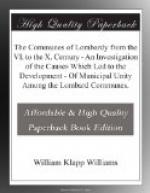Of course many of the fugitives who sought asylum in the towns were as low as the great numbers of the semi-servile population, but much that was new and of a better character and intelligence, and even a large amount of property, which later gave birth to commercial and other interests, were introduced by members of the higher classes fleeing from their more powerful neighbors. Also the human instinct of seeking fellowship in misfortune probably assisted in increasing the numbers which in times of trouble flocked towards the towns as a haven of refuge and a place to seek support. To see how they were in a measure enabled to attain these results, we must now consider the first of the two facts mentioned above, that is, the power in civil affairs gained by the bishops.
When the Lombards of the conquest, in their hatred of everything which savored of the old Roman civilization, overthrew all the established offices of city government to replace them with others of barbarian name and origin, or to leave them unfilled altogether, among the time-honored officers of the Roman rule was one whose powers were everywhere recognized, even if at present it is a little difficult to define with precision his duties. I refer to the defensor urbis. This office came into prominence when Roman despotism found that it was overreaching itself by grinding down the defenseless curiae below the margin of productiveness. The duties of the defensor were, as his name implies, to protect the powerless inhabitants of the cities against the exactions of the imperial ministers. He enjoyed many important privileges of jurisdiction, and these were materially increased by the legislation of Justinian; and soon the defensor became an important officer of the municipality.[8] What particularly concerns us is that he was the only municipal officer who was elected not by the votes of the curia alone, but by those of the whole people forming the municipium, including the bishop and his clergy. Now in the period just preceding the invasion of the barbarians, the clergy alone possessed any energy and influence; so into their hands fell the control of this new institution, and consequently all that remained of life in the municipal system.




